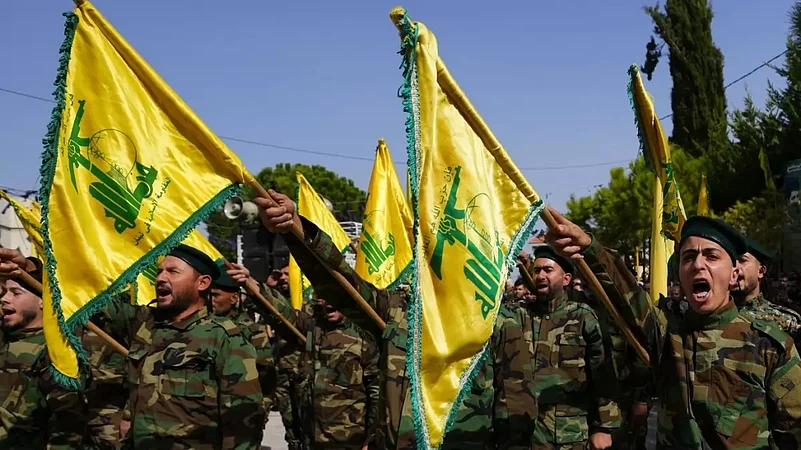Since Israel’s war on Gaza, fears of the fighting spreading to other countries and engulfing the entire region was taken as a given. There was widespread belief that another cycle of war to destabilise the Middle East was on. However despite the outrage in the Arab world, at the relentless bombings that have killed more than 22,000 in the Gaza Strip, most nations have shown remarkable restraint. Arab rulers while issuing statements and calling for a ceasefire to stop the bloodletting, are not prepared to go beyond that. The one exception is Qatar that worked as a negotiator to get a ceasefire and exchange of prisoners for hostages for a brief while. Neither Egypt, Jordan nor the Arab Sheikhdoms have an appetite for war. The Arab powers much like the rest of the world had for decades chosen to shrug off the Palestine issue, concentrating instead in improving relations with Israel. The Abraham Accords, signed by Israel and the UAE and Bahrain in September 2020 normalized diplomatic ties between the two countries. This was followed by Sudan and Morocco also signing in and normalizing relations with Israel. Saudi Arabia was next in line to do so, but the October 7 attack by Hamas and what followed, had put a stop to this. It is unlikely that Saudi Arabia will be in a position to recognise Israel and have normal ties with that country. The voices from the mosques and the bazars will not tolerate their rulers doing so after the retaliatory attacks by Israel on Gaza’s people.
While Iran has so far not directly confronted Israel or the US, it had activated its proxies – the Hezbollah in Lebanon, the Shia militia in Iraq and Syria. The Houthis of Yemen have been active and firing drones and rockets on to cargo carriers on the Red Sea. Houthis have disrupted world trade as most containers now take the longer route around the Horn of Africa, hiking up freight costs. Houthis are backed by Iran. But Tehran has been careful to keep all this at a manageable level and make certain that nothing is traced back to Iran.
Iran is well aware that Israel has been working against its nuclear program for several decades. Israel’s relations with Sunni powers like Saudi Arabia and the United Arab Emirates (UAE) improved by leaps and bounds when all three countries worked together against the Iran nuclear pact signed by Tehran in 2015. The common strategic interests drew the three countries to staunchly oppose the deal. Finally, they had the way during Donald Trump’s presidency. Hopes of reviving the nuclear deal have risen since Joe Biden came to office in 2021. Iran knows well that Israel and the US are looking for an opportunity to destroy Iran’s nuclear program, and Tehran does not wish to expose itself to such a possibility.
“The proxy conflict is already ongoing. Iran is in a serious dilemma given that its deterrence is gradually exposed while its ability to take any direct action remains limited. But not taking any action also exposes Iranian claims of heading an axis of resistance faced with a US-Israel axis. It is still unlikely for Iran to take any aggressive action but wars are not necessarily started with calculated actions. The room for another strategic miscalculation and further escalation remains open,’’ says Muddassir Quamar, associate professor at New Delhi’s Jawaharlal Nehru University.
There has been enough provocation to draw Iran into the conflict. Israel and the US are stepping up attacks against Iran-backed militia across the region. First, Israel killed Hamas leader Saleh al-Arouri in a suburb of Beirut. A week earlier Iranian General Sayyed Razi Mousavi, an adviser of the Iranian paramilitary Revolutionary Guards based in Syria was killed in an Israeli airstrike in Damascus. The US carried out two deadly drone strikes against Iraqi militia in Baghdad. An Iraqi government spokesman called it a flagrant violation of Iraq’s security. Ironically Iraq is hosting US troops in the country. Following the Gaza war, there were more than 100 attacks on US military camps in Iraq by the militia. However, no major damage was done. There were airstrikes against targets in Syria by both the US and Israel. Earlier this week, Washington warned Yemen’s Houthis of punitive action. The Houthis in an act of solidarity with the people of Gaza, have been aiming at vessels plying the Red Sea. Though unrelated to the Gaza war, the blasts that killed 84 civilians gathered at the grave of popular Iranian general Qasem Soleiman, in the Kerman area of southern Iran, further adds to the instability and unrest in the region. The Islamic State has claimed responsibility. The IS, a Sunni group dislikes Shia Iran for its support of Syria’s Bashar-al-Asad’s regime. Iran has vowed vengeance.
But neither Iran’s Ayatollah Ali Khamenei nor Hezbollah’s Hassan Nasrallah wants to confront Israel as of now. Iran would like to consolidate its position. China helped to broker peace between Iran and Saudi Arabia and the Sunni fiefdoms of the Gulf. After several years Iranian and Saudi dignitaries are visiting each other. Iran is looking not just for political engagement but also trade and economic ties with the Gulf Cooperation Council(GCC). The situation could change later, but it is not in either Hezbollah or Iran’s interest to get into a full-scale war with Israel, knowing it has solid American backing and the US could well get into the fray if need be. So neither side wants to escalate, but the situation in the region is so fragile that a small misstep could trigger a full-fledged war.



























